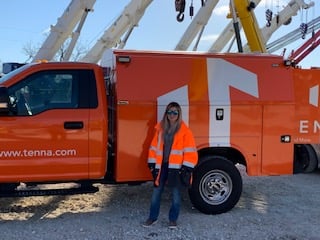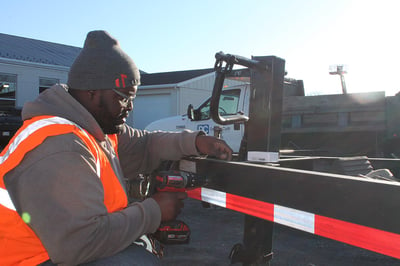
Diversity, equity, and inclusion are essential for all industries in today’s global and cross cultural climate. Construction fields, in particular, can benefit from intentional inclusion, equity, and diversity policies that move the industry away from its neurotypical, heteronormative, male-dominated roots into a more progressive industry with varied partnerships, leadership representation, and workforce.
Explore diversity, equity, and inclusion (DEI) in the construction industry, including the field’s history and progress in this area and how Tenna is leading the way with a focus on DEI programs and policies.
DEI in Construction: A Historical Overview
The construction industry has a history of “like attracting like,” with most companies hiring and furthermore promoting workers that exhibit stereotypical male characteristics. This lack of diversity and inclusion leaves many potential workers feeling off-put or excluded by the industry’s “boy’s club” reputation.
The 2021 Bureau of Labor Statistics survey shows a monumental lack of De&I in construction. Based on the survey results:
- 87.9% of construction workers are white.
- Only 11% of construction professionals are women.
- 32.6% of construction professionals are Hispanic or Latino, only 6.3% are Black, and only 2.1% are Asian.
- In the UK, 2% of construction workers are members of the LGBTQ+ community. (The U.S. does not collect its data on LGBTQ+ representation in the construction workforce.
 This lack of diversity has led to claims of racism and sexism, making many employees who come from traditional marginalized backgrounds afraid of and/or intimidated by their bosses and co-workers.
This lack of diversity has led to claims of racism and sexism, making many employees who come from traditional marginalized backgrounds afraid of and/or intimidated by their bosses and co-workers.
Fortunately, workforce and cultural shifts in recent years have led to changing policies in construction. Baby boomers in the industry are retiring, the Covid-19 pandemic led to unprecedented layoff rates, and the Great Resignation has seen 47.8 million workers quit their jobs since 2020.
The pandemic and the Great Resignation have changed how employees think about their work and what they expect from their employers. For the millions of adults either not working, working part-time, or working remotely, the pandemic offered a period of reflection on their workplace expectations. Post-pandemic, employees who once settled for jobs with low wages or minimal benefits are becoming more selective. Among their expectations are higher pay, more opportunities for job advancement, equal treatment, and more respect.
Respect goes hand-in-hand with diversity, equity, and inclusion. Construction companies now understand that prioritizing their DEI efforts is necessary if they want to succeed in the post-Covid job landscape.
Global social movements like #MeToo, Black Lives Matter, and LGBTQ+ and disability awareness are also impacting the construction industry. This spotlight on social injustice is changing how contractors and construction firms hire workers. Overall, construction companies find it necessary, beneficial, and profitable to prioritize diversity, equity, and inclusion.
Achieving a DEI-forward workforce is a process. Even the most diverse construction companies must change how they treat diverse hires on the job. Racist incidents like verbal slurs, posting racist symbols, and relegating certain workers to the most undesirable tasks are still common in the construction industry.
What Role Does DEI Play in the Construction Industry?
Diversity, equity, and inclusion are facets of a more significant workplace movement toward ESG practices. ESG stands for emotional, social, and governance, and refers to a set of standards companies can use to build a more resilient business with predictable, long-term success.
Across industries, the social (S) aspect of ESG centers on building and managing relationships between employees, company shareholders, and the surrounding community. The social element in construction involves customer satisfaction, good safety practices, community involvement, and DEI initiatives.
It can be highly beneficial for a construction company to track ESG-related metrics, particularly those in the social sphere. Prioritizing DEI within your social efforts can yield the following benefits, among many others.
Long-Term Profitability
A 2021 study found that companies with diverse workforces are 35% more likely to see higher financial returns than the national industry average. Senior executive teams benefit as well: for every 10% increase in racial and ethnic diversity, senior executive teams see a 0.8% increase in earnings before taxes and interest.
Less Exposure to Risk
Aspects of ESG, like employee diversity and fair compensation, are preventative strategies for reducing a company’s exposure to legal risk. Some experts consider diversity to be a risk management issue. This is because companies with diverse workforces are far less likely to face discrimination lawsuits and are better equipped to defend themselves against them if they occur.
Better PR
A construction company that promotes DEI by participating in events that benefit community groups, such as employee fundraisers or sponsorships, can quickly build goodwill in the community in which they operate. These DEI efforts can also yield positive PR opportunities, build company culture, and bolster website references and product reviews.
Attracting the Next Generation
Millennials are three times more likely to apply and remain employed at a company based on its social and environmental stance. By promoting DEI, a construction company can problem solve in advance for worker shortages that will inevitably arise when more baby boomers retire.
Staying Ethical
When a company in any industry does not employ ethical business practices, it can lead to significant profit losses, dissatisfied employees, and an uncooperative work environment.
While construction businesses may not receive tangible fines or repercussions for hiring a monochrome workforce within legal parameters, ignoring ethical DEI practices can hurt construction companies in other ways. For example, when employees from a diverse group feel outcast or excluded, the resulting stress can easily lead to a loss of focus, resulting in on-site accidents or poor work performance.
Why is Diversity, Equality, and Inclusion Important for the Construction Industry?
By committing to DEI in hiring practices and workplace policies, a construction company can increase efficiency, fuel innovation, and boost employee morale. Advantages of prioritizing diversity, equity, and inclusion in construction are extensive.
Wide Pool of Untapped Talent
A 2022 study found a record-high number of 449,000 unfilled construction positions in April. Yet contractors are still struggling to fill almost every type of construction position, with 89% reporting difficulty finding hourly craft workers. Another 86% of firms seeking salaried construction professionals state similar problems with filling job openings.
Worker shortages can quickly lead to project delays, employee burnout, and dissatisfied clients. Sixty-one percent of construction firms cite a shortage of workers as the reason for a delayed project.
Despite worker shortages, 90% of firms that employ hourly craft workers have at least one position to fill, and 62% have openings for a salaried construction professional.
Under-represented DEI groups represent an untapped market of talent. For example, Black workers only comprise 6% of the construction workforce, despite having made up about 12% of the national workforce in 2019. Women make up around 11% of the workforce in construction. While not everyone will meet eligibility requirements, contractors and firms miss out on a wider labor pool by disregarding their DEI efforts.
New Perspectives Fuel Innovation
With increased diversity, equity, and inclusion come an influx of new perspectives that can drive innovation and creativity. Employee diversity in construction is not just about hiring more workers in the racial minority; when a company commits to its DEI practices, it sees an influx of employees with different industry backgrounds and prior work experiences.
DEI employees can draw on their varied past experiences, both in life and in the workplace, to bring new perspectives, talents, innovative ideas, and abilities to the job. For example, a construction firm can hire a worker with experience in another area of the industry or someone with foreign work experience.
By virtue of their diverse work background, the employee may know a more efficient method of completing their job. When passed on, this information can lead to innovative construction practices that can reduce costs and boost morale.
Improved Employee Morale
Construction workers are six times more likely to die by suicide than from a fall on the job. Construction workers face incredibly high rates of mental illnesses like depression and self-reported pain. While some of this distress can be attributed to the inherent risk involved in the construction profession, many employees cite workplace culture as the source of their emotional distress.
Diversity and inclusion in the workplace can improve employee well-being and morale. A 2022 study by the International Labour Organization found an association between high levels of diversity and inclusion in the workplace and greater workforce well-being. Workers who feel comfortable and included at work are more likely to collaborate, which is crucial in the construction industry.
Boosting employee morale also reduces your risk exposure. Employees who feel included and respected at work are less likely to file complaints that may put your business in financial jeopardy or seriously compromise your PR.
What Diversity, Equality, and Inclusion Means at Tenna
 Tenna, a revolutionary construction technology platform, is setting the standard for DEI practices in the workplace. Tenna expresses its commitment to diversity, equity, and inclusion in four key ways.
Tenna, a revolutionary construction technology platform, is setting the standard for DEI practices in the workplace. Tenna expresses its commitment to diversity, equity, and inclusion in four key ways.- Increase Diversity Hiring: Tenna conducts on-campus recruiting events to target diverse talent pools at HBCUs and other institutions founded on DEI. Tenna also prioritizes hiring and internally promoting diverse talent for executive-level and management positions.
- Promote Current Diversity Talent: Tenna recognizes the importance of retaining current talent, so the company actively promotes, mentors, and invests in diverse talent from within while continuing to seek diverse talent externally.
- Continuous Education and Training: Tenna hosts and attends DEI-related seminars and events, and encourages its employees to volunteer at organizations that support people from diverse backgrounds. By participating in events like Construction Inclusion Week, Tenna ensures its employees receive education and up-to-date workplace diversity and inclusion training.
- Maintain Partnerships with External Organizations: Tenna partners with several organizations that promote underrepresented groups. Tenna hosts interns from its partnering companies, allowing young workers to gain professional experience in the construction industry.
What Role Does DEI in Construction Play at Tenna?
Tenna focuses on DEI by participating in equitable programs, such as Independence 360 and the Dorson Community Foundation.
Dorson Community Foundation
Tenna’s established and has an ongoing partnership with the Dorson Community Foundation, which provides SAT preparation services for low-income students of color, has benefited both companies. In 2020, Tenna formalized the collaboration with the New Jersey company with one main goal in mind: building a rotation STEM internship program.
Tenna created an internship program in which Dorson students can gain real work experience and acquire professional skills that will serve them throughout their careers. Tenna hosted its first interns in 2021. Based on the program’s success, they hosted additional interns in the summer of 2022. Tenna also offers these students an internship for the rest of high school and throughout college, preparing students for a full-time job upon graduation.
Independence 360
Tenna recognizes that diversity comes in many forms, and when considering DEI practices, many companies forget about individuals with special needs, such as those on the autism spectrum. To show its promotion of inclusion of all kinds, Tenna partnered with Independence 360, a program that teaches vocational skills to adults with autism and related special needs.
Tenna employed two adults from Independence 360 pre-Covid and is working with other special needs adults from the program as remote trainees—the first step before paid employment. In doing so, Tenna offers adults with special needs a unique opportunity for employment in the industry.
Tenna has set the standard for diversity and inclusivity in construction through these powerful partnerships. Other construction companies can follow Tenna’s lead to ensure DEI for their workers, clients, and partners.
Commit to DEI in Construction with Tenna
Tenna is not only a construction industry leader in DEI practices and outreach. Its construction technology platform is also revolutionizing equipment fleet operations. With over 100 years of construction experience, Tenna offers actionable information to give your construction equipment management system a competitive edge.
Tenna helps construction companies stay current in technology and operations with Form-Free downloads about construction technology and costs. Tenna also offers educational tools like a competitor comparison and technology guide.
Book a call with Tenna today to learn more about our services and commitment to diversity and inclusion in the construction industry.
About Rokssana Craig
As Director of People Operations, Rokssana leverages her HR experience to build, develop, and retain Tenna’s employees. Rokssana has built talent acquisition strategies and has acted as a trusted advisor to leaders within the tech, education, finance, and transportation industries. As an alumna of The Wharton School at The University of Pennsylvania, Rokssana brings an innovative approach to employee development and acquisition. Her commitment to DEI, performance coaching, and employee development led her to Tenna where she has the opportunity to create a collaborative, equitable, and awesome place to work.
